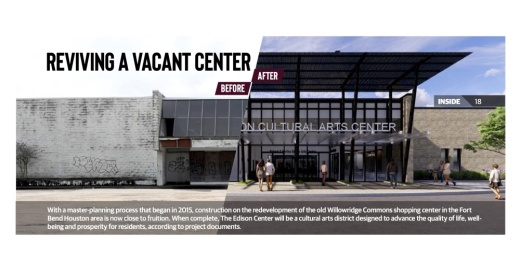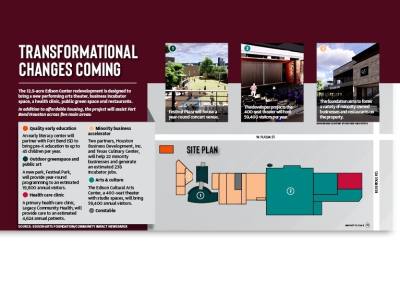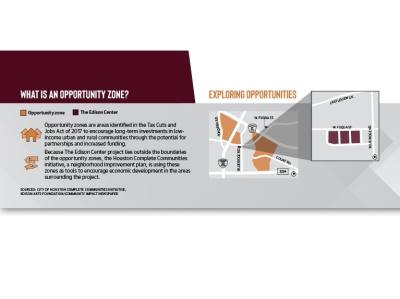Called The Edison Center, the 12.5 acre, $18.8 million redevelopment will repurpose what the developer calls a “blighted” shopping center located at 7100 Fuqua St., Missouri City, which has sat empty for 10 years. The center will transform into a new cultural arts
district designed to advance the quality of life, well-being and prosperity for residents, according to documents from the project’s capital campaign.
Fort Bend Houston, the area where the mixed-use redevelopment is slated to open, is a historically middle-class Black community, said Fort Bend County Precinct 2 Commissioner Grady Prestage, who serves the Sugar Land and Missouri City area. The median household income in 2019 was $62,322, higher than the rest of Houston, at $52,338, according to the city’s super neighborhood resource assessment.
Still, the community’s status as a destination has faded since its development in the 1970s, said Theodore Andrews, chair of the Hiram Clarke/Fort Bend Houston Redevelopment Authority, also known as Tax Increment Reinvestment Zone 25.
“This community was a premier suburban portion of Houston in the 1970s so people wanted to live in this area,” he said. “After it began to change, people were not looking to the area as much, so this new development is certainly positive.”
The Edison Arts Foundation, a local Black-led arts nonprofit, is developing and managing the space through the collaboration of 12 nonprofits and public donors, including the city of Houston, Fort Bend ISD and Houston Business Development Inc., a nonprofit that looks to stimulate economic growth in communities throughout Houston.
Once complete, the revitalization project is designed to create new services and amenities through affordable housing, health care, economic opportunity, job creation, early childhood education, performing arts and cultural education, Edison Arts Foundation President Charity Carter said.
The $26.2 million Phase 1 combined affordable housing, which was completed last June, and a prekindergarten early education center set to open in late March. Construction on Phase 2 of the Edison Center, which costs $18.8 million, is set to begin in March.
By fall 2022, the center’s retail components should be completed. A year later, in fall 2023, the centerpiece of the project, the Edison Cultural Arts Center, is scheduled to be completed, said Carter.
Community benefits
As a resident of the Briargate neighborhood in Fort Bend Houston, Latasha Armstrong Mable said her daughter will directly benet from the redevelopment.
Mable’s daughter has been enrolled in the fine arts program at the Fort Bend Academy of Arts & Dance—run by the Edison Arts Foundation—for the last three years.
The academy at 1959 Texas Parkway, Missouri City, is about a five-minute car ride away for Mable. But there are parents who do not have access to the academy due to a lack of public transit, she said.
The Edison Center will also bring a 400-seat main stage theater, a 100-seat black box theater, a dance studio and space for after-school programming, per project documents.
“This will provide access to the bus line and [Metropolitan Transit Authority of Harris County services] for people that do not have a car and cannot get their child there,” Mable said.
The arts academy’s move onto Fuqua Street will serve Fort Bend Houston, where 91% of the 3,239 Fort Bend ISD students are economically disadvantaged, according to project documents. The after-school arts programming offered by the center will provide students in local schools more opportunities for arts education, FBISD officials said.
“We are excited The Edison Center will offer some of our students additional exposure to the arts while in school and after they graduate,” district officials said in an email.
However, potential benefits extend beyond the classroom to the local economy, said Martha Castex-Tatum, Houston’s vice mayor pro tem, who also represents Houston’s District K, where the Fort Bend Houston Super Neighborhood shares jurisdiction with Fort Bend County’s Precinct 2.
According to nine-year project projections, two business incubators that will move into the mixed-use redevelopment—Houston Business Development Inc. and the Texas Culinary Center, a co-op/multi-kitchen, demonstration area, and bodega concept—will benfit 22 minority business owners and could produce 238 incubator jobs generating $12.6 million. These jobs will serve early-stage startups that do not yet have a business model in place.
The redevelopment is also projected to serve more than 4,600 patients annually through a partnership with primary health care clinic Legacy Community Health, which has plans to move into the center in fall 2022.
In addition, the Edison Center is estimated to draw 19,800 annual visitors to Festival Park, its park space where year-round programming, concerts and farmers markets will be available. This joins the estimated 79,200 annual visitors expected at the redeveloped shopping center, which includes visitors to the development’s Edison Cultural Arts Center and Festival Park green space, according to project documents.
The visitors the development is expected to bring are key to not only revitalizing the existing community, but also bringing in new development, said Gwendolyn Tillotson, the city of Houston’s deputy director for economic development.
“When you bring a project like this into an area, it draws other complementary types of development,” Tillotson said. “We’re hoping that this just serves as a sort of catalyst to attract more [of] the same type of investment but some complementary investment as well.”
Decision to reinvest
What is now a vacant shopping center was during the late 1970s and 1980s Willowridge Commons: a thriving retail center with big-box brands such as Kroger and Walgreens, Andrews said.
Prestage was a tenant in the center when he was first elected in 1990.
“At that time, the Kroger had been gone for a few years,” Prestage said. “So all of the other tenants were starting to go away.”
Efforts to attract local grocers to the site, including HEB when it first came to the Houston area, were unsuccessful, Prestage said. These were the days prior to the completion of Sam Houston Tollway when Fuqua Street dead-ended a couple of blocks east of the former shopping center,
Prestage said. Thus, HEB could not justify opening a store in a location with such little traffic, he said.
By the time Carter and the Edison Arts Foundation discovered and bought the property in 2020, it had been at least 20 years since the shopping center had received any kind of major development, according to project documents.
That acquisition came amid efforts from the Edison Arts Foundation to expand from performing arts and education after seeing its families’ economic struggles, Carter said.
The foundation had been considering a 3-acre parcel of land for its relocation before the 12.5-acre Willowridge Commons property came to its attention, Carter said.
“When this larger space came to our attention, then a larger mindset had to be put forth,” she said. “A larger impact, a larger-scale plan for sustainability.”
In 2015, the Edison Arts Foundation began drafting a master plan for the center and the adjacent property that became Edison Lofts, a 126-unit affordable housing complex.
As the project has pushed forward, other entities such as the Hiram Clarke/Fort Bend Houston Redevelopment Authority have helped support the project.
Though a TIRZ may only fund public infrastructure projects, the redevelopment authority has committed $500,000 in its capital improvement program budget over a five-year period to address building degradation at the shopping center, Andrews said.
“From a development point of view... [the Edison Center] is positive because it is bringing new development in the area,” Andrews said. “New development is something that this area has not seen consistently.”
Looking forward
The Edison Arts Foundation has also received financial support from the city of Houston through its Complete Communities initiative.
The initiative, started in 2017 by Houston Mayor Sylvester Turner, seeks to improve neighborhoods through an action plan outlining a vision, policies, goals and projects.
The city of Houston identified Fort Bend Houston as one of these neighborhoods in 2019 and the Edison Center project as an early success.
So far, the city has invested $5 million in the second phase of the project. Edison Lofts, which opened in June, received $8 million in tax credits from the city of Houston to encourage development, according to the action plan.
Meanwhile, the Fort Bend Houston neighborhood has two census tracts that are state-designated opportunity zones, which are areas identified in the Tax Cuts and Jobs Act of 2017 to encourage long-term investments in low-income urban and rural communities through partnerships and increased funding.
The Edison Center is located across the street, just outside one of those zones, Castex-Tatum said.
Though the city of Houston is currently unable to adjust the zones’ boundaries, it is working to provide peripheral economic support to the project from within the zone, Castex Tatum said.
“It’s very preliminary, but we have identified that space as a potential good location for a brick-and-mortar grocery store,” she said.
Coming up next for the Edison Center project is the opening of its pre-K center, which will offer two classrooms for up to 40 students on the same site as the Edison Lofts property, Carter said. That opening is scheduled for late March, coinciding with the start of the construction for the former shopping center.
“If we can make sure that people have the necessities to create a holistic community, I think that we will see that our communities continue to thrive,” Castex-Tatum said. “The residents there deserve to have those services near their homes.”







